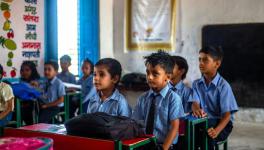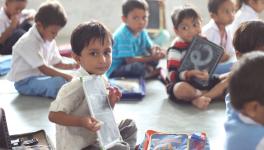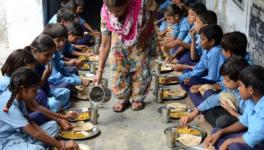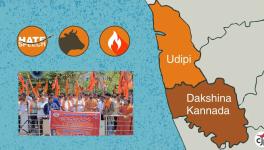K’taka Govt School Teachers’ Fight for Recovery and Survival
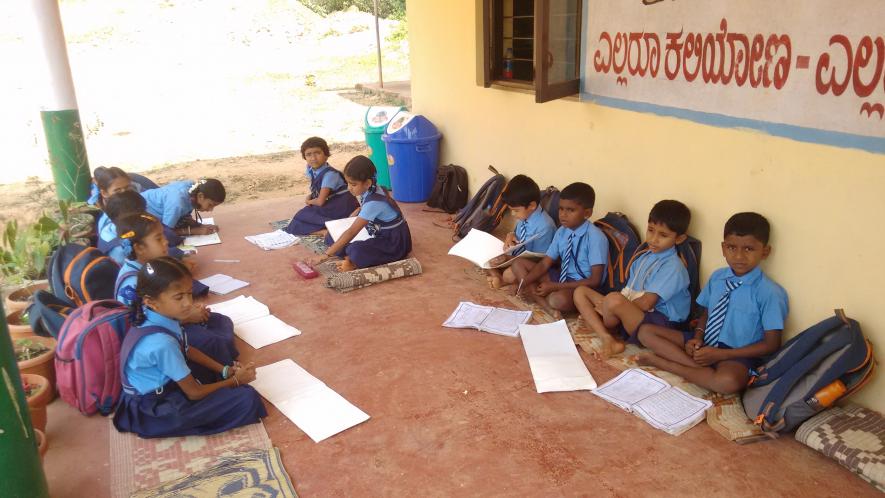
A drawing class in progress
The teachers of the Jodupala Government Higher Primary School in Kodagu district of Karnataka had already made preparations in April 2019 to ensure that when the school reopens after the summer vacation in June 2019, all their students return to school. They had raised funds and bought steel cupboards so that children can leave their school material such as notebooks and textbooks in the school itself during the vacation. The teachers hoped that this way, not only will the material remain safe (from the threat of heavy rains that lashed the district in the monsoon of 2018), it will also provide an incentive for the children to come back to the school after the vacation.
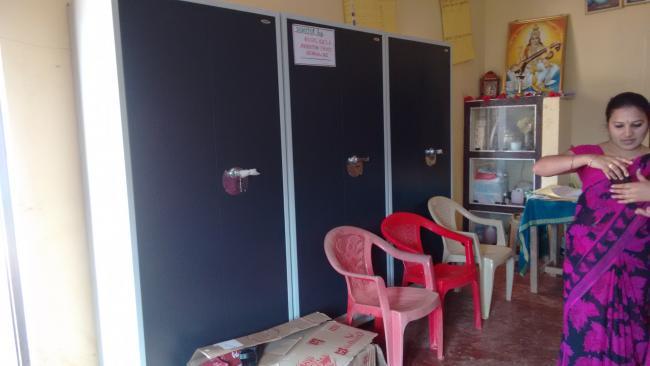
Cupboards purchased by the school to keep students' material safe.
Reports of government schools in Karnataka being shut down abound due to inadequate student strength. A New Indian Express report from July 2018 states that more than 28,000 schools are to be shut down across the state. In this context, the efforts by five teachers of the Jodupala school to keep their school open against all odds, are truly remarkable – especially, in the backdrop of the landslides that ravaged this district in August 2018. Jodupala was one of the 40 villages in Kodagu district that were severely affected by the landslide. It experienced loss of lives, houses and farm lands. The village school had 50 students studying in classes 1 to 8. The school building was unharmed and served as a relief centre or ‘ganji kendra’ for a few days. After the relief camps closed, villagers moved to other villages or towns as many of them had lost their houses or their houses were uninhabitable. They moved into rented houses or lived with the relatives. The children were moved to schools which were close to where their families lived. But after the disaster, the teachers decided to come back to the village and reopen the school.
None of the teachers lived in Jodupala. When the landslide struck, many people fled their homes and took refuge in relief camps. Damayanthi, the in-charge headmistress of the school and other teachers coordinated relief activities in relief camps in the towns where they lived.
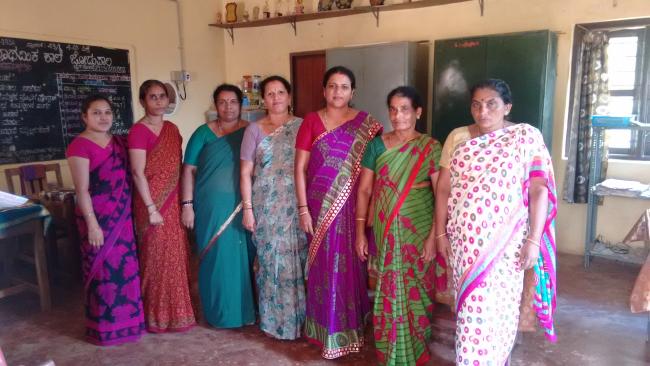
Meenakshi 3. Amaravathi 4. Kavitha, 5. Damayanthi; 6. Honnamma 7.
Dhanalakshmi (Honnamma and Dhanalakshmi are mid may meal cooks)
Amaravathi, one of the teachers, says that they came across their students in these camps. The children and even their parents and grandparents would rush to them when they saw the teachers at the camps. The children were relieved to see their teachers and would hug them and cry. They had been traumatised by the disaster. They had crossed swollen streams, seen trees being uprooted, walked miles in the rain, sometimes barefoot, to get to the camps. Many had lost their cattle and pets. Teachers made efforts to comfort and counsel these children at the camps.
In September 2018, after the disaster had subsided, headmistress Damayanthi spoke with her colleagues about re-opening the school in Jodupala. They felt that they must provide their service to their own students. All five teachers (Damayanthi, Amaravathi, Meenakshi, Deepika and Kavitha) agreed. As did the two cooks, Honnamma and Dhanalaksmi, who were themselves affected by the landslide – they too had lost their homes and were living with relatives in other villages. Damayanthi obtained permission from the Block Education Officer and the teachers came back to Jodupala. For a few days, no student came to the school. Families were yet to return to the village. The teachers waited, hoping that villagers would return with their children. Then teachers took turns to call each of the parents. They coaxed and cajoled the parents to send their children back to the school. The first to return was a boy called Akshay. His family had moved to a nearby village called Sampaje and he was admitted to the school there. He, however, missed his old school and friends. He apparently pleaded with his parents to send him back. Similar was the case with many other children, says Damayanthi.
The Karnataka State Road Transport Corporation (KSRTC) had provided free bus passes to many such children who had been dislocated during the landslides. Children could travel to their schools from relief centres or from wherever they were living. The teachers of the Jodupala school met with the KSRTC depot manager and requested her to provide bus passes for students coming to the Jodupala school from relief centres and places in nearby Kallugundi and Sampaje villages. They also encouraged all the parents too to meet the depot manager, who responded positively to their requests. Panchayat members too put in requests to the KSRTC depot manager. Eventually 32 out of 50 children came back to the school. By January 2019, most of these children had come back to their homes in Jodupala.
Amaravathi says that when the children came back, they seemed to have not recovered from the trauma. They were not playful and active as before. The teachers counselled them and engaged them in many games and activities before the children returned to their normal selves. Many donors provided support to the students in a number of ways.
The Rotary club provided books and notebooks to the students. MYRADA Kaveri Pradeshika Samsthe (MYKAPS), a Mysore-based non-government organisation (NGO) that works in the area of children’s development, provided uniforms, shoes, school bags and umbrellas to all the students. In order to help the students recover from the pain of the disaster, the teachers organised a picnic for them. Coordinator of MYKAPS, Saleela Patkar, helped raise funds for the picnic. Physical education teacher Meenakshi says that the picnic helped the students forget the horrors of the disaster. She says that they made the students understand that such calamities occur all over the world once in a while, and that they are not the only ones facing such problems. After the picnic, they organised an essay-writing competition for the students. All of them wrote about the joy of the picnic and not about the sorrow of the disaster, she says. Damayanthi says that even parents who had moved out of Jodupala say that they will bring their children back in the coming academic year.
Meenkashi says that they do not want to lose students. “We are grateful to the parents for bringing their children back and giving us an opportunity to do our duty. As government school teachers, we are in competition with the private schools. Most children who come here are poor and we have to see that no child is deprived of any opportunity or facility.”
Now, as another monsoon approaches, people in the area live in fear. There is talk that landslides may recur. “There are many rumours, but we do not have any clear guidelines or official information (about disaster preparedness ahead of the monsoon),” says Deepika, one of the teachers. Even those, who have come back to their homes, talk of vacating their homes during the monsoons fearing that the lands on which their house stand are still unstable. The teachers fear that if this happens, the school will lose students. The school in the neighbouring village of 2nd Monnangeri has been shut down due to irreparable damage to the building. They are hoping the same fate does not befall this school. “We don’t know what the next rainy season will bring. If the parents move to other villages, they will take their children away. Then our school will have to shut down. We are so many teachers here, we don’t want to let that happen,” says Damayanthi.
Author is an independent broadcaster and writes on development issues.
Get the latest reports & analysis with people's perspective on Protests, movements & deep analytical videos, discussions of the current affairs in your Telegram app. Subscribe to NewsClick's Telegram channel & get Real-Time updates on stories, as they get published on our website.











